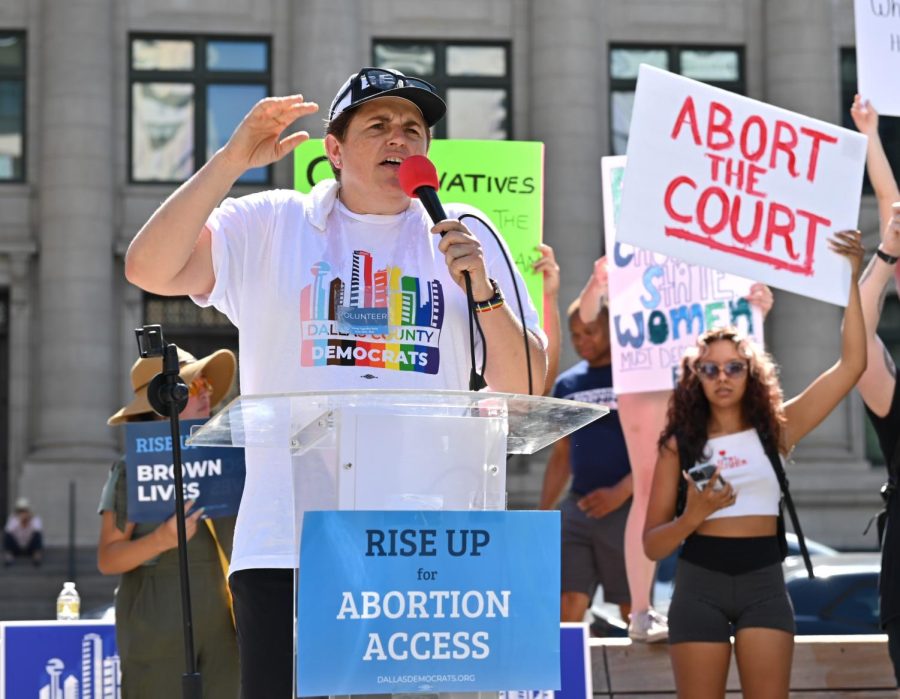Texas abortion ban goes into effect
Dallas County Democratic Party Chair Kristy Noble speaks at the Rise Together Rally at Main Street Garden in Dallas on June 25.
August 25, 2022
Just two months after the Supreme Court’s decision to overturn Roe v. Wade, almost one-third of all states have enacted abortion bans. On Aug. 25, Texas put into effect a near-total ban with the possibility of life in prison for any medical provider who is found guilty of performing an abortion.
In a vote of 5-4 in the case of Dobbs v. Jackson Women’s Health Organization on June 24, the Supreme Court turned the decision of abortion rights over to the states. This action allows state governments to protect or criminalize abortion as they see fit.
Protests erupted in major cities all over the country in reaction to this news, while many anti-abortion organizations have celebrated the ruling.
“As if the general fear of pregnancy before I’m ready to be a mom wasn’t enough,” Eastfield education major Sara Almaraz said. “Now I’m even more scared of what the consequences could be.”
In addition to restricted access to abortion care, the Dallas Morning News reports that some Texas pharmacists are pausing the distribution of certain medications that have the potential to induce abortion out of fear of possible civil lawsuit.
Stories of women being forced to endure dangerous health concerns while pregnant with sometimes non-viable fetuses have been gaining attention since the Supreme Court’s decision.
In Houston, a woman was forced to wait until she developed a life-threatening condition before she was allowed access to abortion care after her water broke at 19 weeks, according to a news release from Planned Parenthood.
“It’s time to stop playing nice,” Dallas Democrats chairwoman Kristy Noble said during an abortion rights protest on June 25.
“The Supreme Court has lost its mind. Thursday it said gun control can’t be decided by the states, and then on Friday it said that women’s bodily autonomy can.”
Noble urged those in attendance to keep their energy up and get everyone they know to vote in the November election.
Quoting statistics from the 2020 presidential election, she said there were 475,000 people registered to vote in Dallas who did not, and 300,000 of them were Democrats.
“A million people are not registered [to vote] in Dallas County,” she said. “We have the numbers right here, and we have 150 precincts where we know those votes are at.”
Democratic candidate for governor Beto O’Rourke also ran for senator against Ted Cruz in 2018 but lost by 216,000 votes.
Now running against current Republican Gov. Greg Abbott, O’Rourke has intensified his position on abortion rights.
“Reproductive health care is under attack in this state more than it is anywhere else in this country, and probably anywhere else in the developed world,” he said at a news conference in Houston. “There’s one person who is responsible for that. That is Gov. Greg Abbott.”
The Supreme Court ruling has prompted many politicians to speak up about abortion rights.
“The first person I called was my daughter, who will be 17 soon, and I’m scared about the environment she’s entering,” State Sen. Nathan Johnson said at the Dallas protest. “I don’t really understand the environment where some people are more afraid of their daughter competing in a track meet against a transgender kid than they are of their daughter being forced to bear the child of her rapist.”
Anti-abortion advocates argue that abortion is rarely necessary because of the option of foster services and adoption. Texas Attorney General Ken Paxton issued a statement supporting the overturning of Roe v. Wade and blamed the 1973 decision for millions of potential lives lost.
Planned Parenthood Federation of America, along with partners including the ACLU and the Center for Reproductive Rights, has challenged abortion bans in more than 12 states.
As of Aug. 23 there are 16 states that have abortion bans in effect.
States with near-total bans include Alabama, Arkansas, Kentucky, Louisiana, Mississippi, Missouri, Oklahoma, South Dakota and Texas. Georgia, Idaho, Ohio and Tennessee have six-week bans, while Florida has a 15-week ban, Utah an 18-week ban and North Carolina a 20-week ban.
“I don’t think a lot of people realize that it’s not as simple as just giving a baby up for adoption,” Eastfield social work major Casey Lowrey said.
“We already have a foster care crisis in this state. Forcing people to have babies they don’t want or can’t care for isn’t the answer.”






